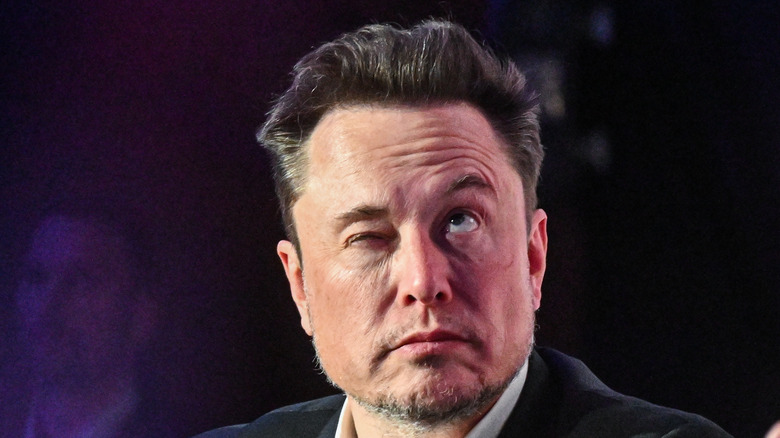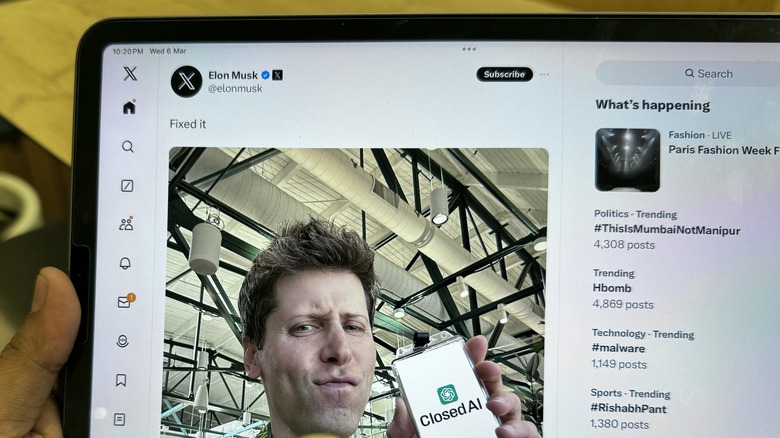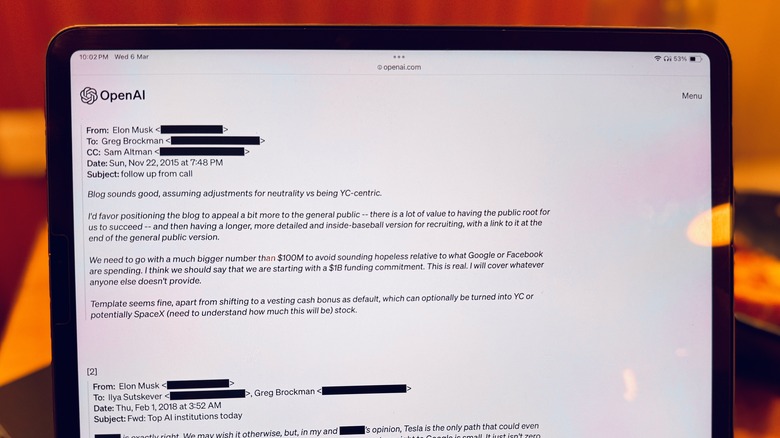OpenAI And Elon Musk Are Airing Their Dirty Laundry Publicly
Tesla chief Elon Musk recently sued ChatGPT-maker OpenAI, citing breach of contract and "betrayal," demanding a return of profits from its key founding members. Targeting the generative AI pioneer for abandoning its non-profit mission, the dramatic legal challenge also took aim at Microsoft's multi-billion dollar investment in the company and the recent leadership turmoil that led to CEO Sam Altman's theatrical ouster and quick return. OpenAI has now published a bombshell post that dismisses Musk's claims and contains a trove of emailed conversations between him and OpenAI leadership.
The issues are said to have started when OpenAI realized it would require a massive amount of computing power to build a safe and beneficial artificial general intelligence (AGI), a yet-to-be-realized hypothetical form of AI at the same cognition level as human beings. At that juncture, Musk — who is among OpenAI's founding figures — and other top minds at the company decided to explore a for-profit future, in contrast to their open-source roots.
"Elon wanted majority equity, initial board control, and to be CEO. In the middle of these discussions, he withheld funding," says the blog post authored jointly by Altman and other high-ranking executives, including Greg Brockman and science chief Ilya Sutskever. The computing power in question here is mostly tied to GPUs, and to such an extent that it has propelled Nvidia into the trillion-dollar valuation class and pushed Musk's Tesla to build Dojo, one of the world's most powerful supercomputers.
Musk desperately chased OpenAI crown
Musk reportedly advised the shot-callers at OpenAI to go public with a $1 billion funding commitment to attract investors while promising that he would cover whatever amount remained in reaching that financial goal. Back then, Musk's wealth had just exceeded the $20 billion mark for the first time, which is roughly one-tenth of his fortune in 2024. OpenAI argues that it deemed Musk's aggressive set of offers — including an alternative merger proposal with Tesla — as contradictory to the company's mission.
In one of his emails, Musk asked the company to see "Tesla as its cash cow" and that his EV company was "the only path that could even hope to hold a candle to Google." Musk pitched that with OpenAI's assistance, Tesla could accelerate the development of its failure-prone Autopilot self-driving tech to "sell a lot of cars," which, in turn, would bring in enough capital to fund OpenAI's computing needs. When Musk's advances were rebuffed, he left OpenAI, an event also confirmed by Semafor, citing internal sources.
A section of the industry watchers note that Musk was salty about the rejection of his pitch at OpenAI, which eventually led to Musk creating his own generative AI company. In the past few months, Musk has targeted OpenAI's money-making endeavors. OpenAI "has become a closed source, maximum-profit company effectively controlled by Microsoft," he posted in 2023.
Both sides are at fault
"The Open in openAI means that everyone should benefit from the fruits of AI after its built, but it's totally OK to not share the science," Musk wrote in one of his emails, which also features some critical redactions. Not all of Musk's arguments are unfounded, even though they might not stand a strong chance in a court of law. OpenAI's founding charter notes that it will publicly share "most" of its research about artificial general intelligence, which it defines as "highly autonomous systems that outperform humans at most economically valuable work."
Musk argues in his lawsuit that the GPT-4 model is at AGI level, while OpenAI hasn't made such claims so far. But at the same time, GPT-4 isn't exactly an open-source product. Instead, it is an openly for-profit tool sold via a subscription that starts at $20 per month for individual use. Thanks to its close ties with OpenAI, Microsoft has also leveraged the company's underlying generative AI tech in virtually every mass-market product under the Copilot umbrella.
At the same time, Musk's claims about transparency and AI-for-the-good-of-mankind arguments have some holes in them. Musk recently started a company called xAI, which has already released a product called Grok, a "spicy" rival to ChatGPT that is also sold via a subscription to users of X, formerly Twitter. Grok's foundation is not open either, and xAI also seems to be chasing a funding goal north of a billion dollars, as per Bloomberg.


